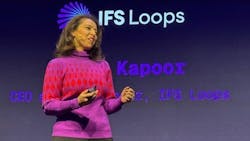IFS debuts package of ‘digital workers’ in next iteration of agentic AI industrial software
What you'll learn:
- Loops adds to the narrative about AI “evolving” the industrial workforce, allowing autonomous management of high-volume operational tasks.
- The agentic AI product is aimed at manufacturing, service industries, energy and utilities, telecoms, aerospace and defense, and the construction industry.
- Unlike traditional automation, RPA, and even generative AI, IFS Loops “digital workers” make context-driven decisions and can run either in the cloud or beside legacy systems.
Related content:
NEW YORK—An AI-based “workforce” programmed with 50 (soon to be 100-plus) agentic skills that assists industrial organizations. Virtual “faces,” complete with hardhats or neckties, attached to specific job functions that humans would no longer need to perform.
This imagery and the excited product launch by IFS here at Industrial X Unleashed might otherwise be a bit scary for a human manufacturing labor pool already understaffed and worried AI could help exacerbate the problem. October job loss numbers are feeding that fire of concern.
All attached here to IFS—the multinational software company that develops and delivers enterprise software for manufacturing, aerospace and defense, energy, and construction—acknowledged the fears about AI as a “job-killer” but were faster to point out their product, known as IFS Loops, adds to the narrative about AI “evolving” the industrial workforce, allowing (as they say Loops does) autonomous management of high-volume operational tasks such as field dispatch, supplier coordination, customer order management, and inventory replenishment.
The agentic AI product is aimed squarely at manufacturing, service industries, energy and utilities, telecoms, aerospace and defense, and the construction industry.
In other words, Loops can free the labor force of more mundane tasks, or “improve operational performance while working right alongside employees to reduce manual tasks,” as IFS said in its PR here behind the software product.
Loops, Somya Kapoor, CEO of that segment of IFS’s business, added in an interview with Smart Industry is about keeping pace with operational change, which she said is faster than ever, with complexity growing much faster “than human teams or legacy systems can handle. Operations leaders and CIOs can’t wait for months of IT rollout to benefit from new capabilities.”
The specifics of what Loops can do
The product as demonstrated at IFS X Unleased here showed 10 “digital workers” who “live” across multiple industries, and they boast 50-plus agentic skills (IFS said around an additional 50-plus will debut in December, meaning a total of more than 100).
IFS designed these virtual workers to backfill operational workflows in dispatch, field service, inventory, and supplier management.
See also: Human intelligence plus AI and how supply chains are changing with this collaboration
Industrial large language models also are involved, to understand context, compliance, and operational rules, “making AI actionable from Day One,” according to an IFS release. “For many, this is their first step into agentic AI and a natural entry point into the broader IFS Cloud ecosystem.”
Unlike traditional automation, RPA, and even generative AI, the IFS Loops “digital workers” make context-driven decisions and can run either in the cloud or beside legacy systems.
‘Pain points,’ tasks that humans no longer need to do, and ROI
In her sit-down with Smart Industry, Kapoor in detail explained what IFS Loops seeks to do, with its agentic capabilities seeking to help “build and redefine your processes by matching data from different systems. You’re not constantly bogged down by … your data being in one system or another. It really rethinks a process from a pain point and a business outcome standpoint.”
This not here to replace human beings, I want to be clear on that. But it exists to amplify their abilities and do a lot more with less.
- Somya Kapoor, CEO of IFS Loops
As an example, she cited IFS Loops’ supplier and order management capabilities, which help to monitor orders autonomously that would otherwise sit somewhere in an inbox, day in and day out, waiting for a multitude of human employees to process, route, and fulfill manually.
As part of the package a “digital supervisor” will even monitor the work of the “digital workers,” provide audit trails and otherwise make sure the AI itself doesn’t make mistakes.
See also: Executives advocate for reshaping of workforce following job cuts from AI
Kapoor said “a few customers” already are using IFS Loops “live in production, in the industrial space, using our ‘digital workers’ that we just launched out of the box.”
She reported that one customer stood up the product in about seven weeks and realized $3 million in cost savings and saved 90,000 manpower hours.
See also: AI that augments the workforce … and doesn’t replace it
“This not here to replace human beings, I want to be clear on that,” Kapoor said. “But it exists to amplify their abilities and do a lot more with less”—and sometimes, she added, to perform supply and order management functions at odd hours when humans are not available to do those functions in support of, say, a field technician who is waiting on parts to perform a repair or installation.
“This is about how I can create a frictionless operational expedience for my field technicians who are doing the most hard, dirty jobs and make life easier for them.”
About the Author
Scott Achelpohl
Head of Content
I've come to Smart Industry after stints in business-to-business journalism covering U.S. trucking and transportation for FleetOwner, a sister website and magazine of SI’s at Endeavor Business Media, and branches of the U.S. military for Navy League of the United States. I'm a graduate of the University of Kansas and the William Allen White School of Journalism with many years of media experience inside and outside B2B journalism. I'm a wordsmith by nature, and I edit Smart Industry and report and write all kinds of news and interactive media on the digital transformation of manufacturing.


